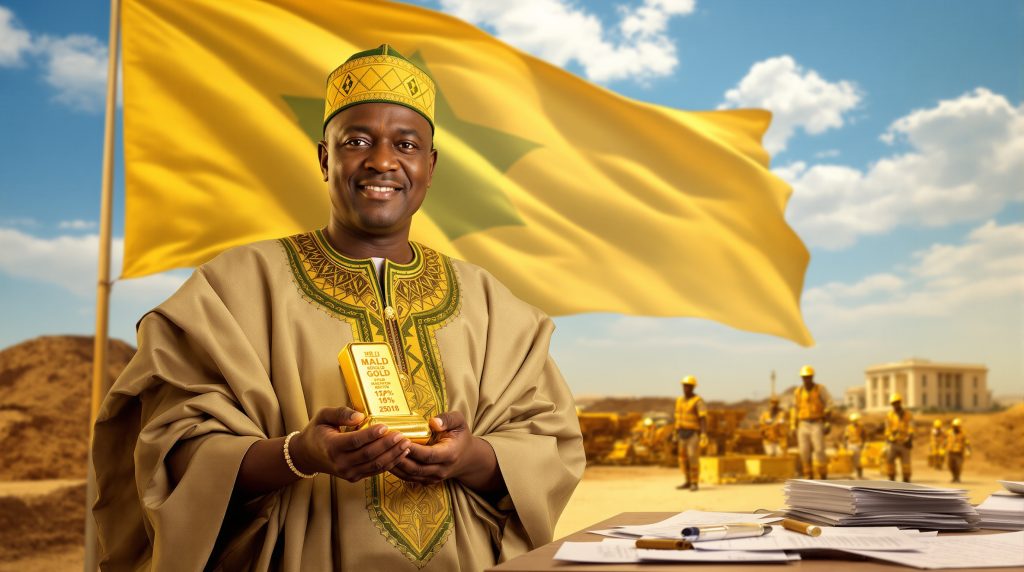How Did Mali's Gold Dispute with Barrick Escalate?
The conflict between Mali and Barrick Gold has intensified significantly since 2023, when Mali implemented a new mining code demanding higher taxes and increased government ownership in mining operations. The situation reached a critical point in early 2025 when Barrick suspended operations at its Loulo-Gounkoto complex after negotiations reached an impasse, resulting in significant consequences for both parties.
A Malian court-appointed provisional administrator took control of the mining complex in June 2025, marking a dramatic escalation in the dispute. This administrative takeover came six months after Barrick had already suspended operations when talks with the government failed to progress.
The standoff has triggered several major developments:
- Mali imposing export restrictions on gold shipments
- Court-appointed administrators taking control of mine operations
- Production dropping to approximately 25% of normal capacity
- Significant financial implications for both parties
This standoff represents one of the most prominent examples of resource nationalism among West African military governments seeking greater control over their mineral wealth. Mali's actions reflect a broader regional trend of governments asserting sovereignty over natural resources, similar to the recent Namibia mining halt affecting uranium extraction.
What Makes the Executive Defection So Significant?
The Strategic Personnel Shift
The appointment of Hilaire Diarra as special counselor to Mali's president marks a dramatic turning point in the ongoing dispute. This development is particularly noteworthy because of Diarra's insider position and the timing of his switch.
According to a mines ministry official speaking to Reuters, Diarra was formally appointed via presidential decree signed in late August 2025. The official confirmed the document's authenticity, highlighting the strategic nature of this recruitment.
What makes this personnel shift especially significant:
- Diarra previously served as general manager of Barrick's Tongon gold mine in neighboring Ivory Coast
- He was actively representing Barrick in negotiations with Mali earlier in 2025
- As a Malian citizen who began his career at the Loulo mine, he brings insider knowledge of Barrick's operations
- His defection represents a pattern where Mali has strategically recruited former Barrick executives
This recruitment follows Mali's earlier enlistment of Samba Toure, another former Barrick executive who now serves as a member of the provisional administration running operations at the Loulo-Gounkoto complex.
The Tactical Advantage
The recruitment of Diarra provides Mali's government with several critical advantages in the ongoing negotiations:
- Intimate knowledge of Barrick's operational strategies and financial calculations
- Understanding of the company's financial thresholds in negotiations
- Insights into corporate decision-making processes
- Technical expertise regarding the Loulo-Gounkoto mining complex
According to sources familiar with the situation, Diarra had flown to Bamako from Ivory Coast specifically to negotiate on behalf of Barrick before switching allegiances. This insider perspective gives Mali unprecedented insight into Barrick's negotiating positions and corporate strategies.
What's at Stake in the Loulo-Gounkoto Dispute?
Production and Economic Impact
The Loulo-Gounkoto complex represents a significant mining asset with substantial economic value for both Mali and Barrick. The scale of production makes this dispute particularly consequential for all parties involved.
| Metric | Value |
|---|---|
| 2024 Gold Production | 578,000 ounces |
| Production Under Administrator | ~25% of normal output |
| Gold Sold Since Administrator Takeover | 1 metric ton (~35,274 ounces) |
| Economic Importance to Mali | Major source of foreign exchange and tax revenue |
| Strategic Value to Barrick | Key asset in West African portfolio |
The dramatic reduction in production capacity—currently operating at only about a quarter of its normal output—demonstrates the significant impact of this dispute on gold supplies and revenues for both Mali and Barrick. Furthermore, the dispute impacts global commodities markets, especially considering recent all-time high gold prices driven by economic uncertainty.
Control and Sovereignty Issues
The dispute centers on fundamental questions of resource sovereignty and control:
- Mali's government seeks increased ownership and tax benefits from its natural resources
- Barrick aims to protect its investment and operational control
- The provisional administration represents a direct challenge to corporate mining rights
- The outcome could set precedents for other mining operations in the region
At its core, this conflict represents the tension between a resource-rich nation seeking greater benefits from its natural wealth and a multinational mining company attempting to maintain profitable operations while navigating changing political landscapes.
How Has Mali Outmaneuvered Barrick?
Strategic Recruitment of Insiders
Mali's government has employed a sophisticated approach to strengthen its position in the ongoing dispute. Their strategy of recruiting former Barrick executives gives them unique insights and capabilities:
- Appointing former Barrick executive Samba Toure to the provisional administration running Loulo-Gounkoto
- Now recruiting Hilaire Diarra as presidential advisor after he represented Barrick in negotiations
- Leveraging insider knowledge to anticipate Barrick's negotiating strategies
- Using technical expertise from former executives to maintain operations despite reduced capacity
According to Reuters reporting, Mali "has previously enlisted former senior Barrick executives to try to outmanoeuvre the company," indicating this is part of a deliberate and ongoing strategy rather than an isolated incident.
Legal and Administrative Maneuvers
The government has utilized multiple levers of state power to assert control over the mining operation:
- Court-ordered appointment of a provisional administrator in June 2025
- Implementation of new mining code regulations beginning in 2023
- Strategic use of export restrictions
- Maintaining partial production to demonstrate operational capability without Barrick's full involvement
These coordinated actions demonstrate Mali's determination to change the terms of engagement with foreign mining companies operating within its borders. By keeping the mine partially operational, Mali is also sending a message that it can manage the asset without Barrick if necessary, similar to how the Ukrainian VAT suspension has been used as leverage in business disputes.
What Are the Regional Implications of Resource Nationalism?
The West African Context
Mali's approach reflects broader trends across West Africa, where several countries with military governments are increasingly asserting control over natural resources:
- Military governments increasingly asserting control over natural resources
- Growing demands for greater national benefits from extractive industries
- Shifting power dynamics between multinational corporations and host countries
- Potential ripple effects for mining investments across the region
The Reuters report explicitly identifies this case as "one of the most high-profile examples of resource nationalism among West African military governments seeking greater control over their gold and uranium wealth," placing it within a larger regional context.
Investor Confidence Concerns
The dispute raises significant questions for mining investment in the region:
- Heightened sovereign risk assessments for West African mining jurisdictions
- Potential recalibration of investment strategies by major mining companies
- Increased focus on political risk insurance and contract stability mechanisms
- Possible impacts on financing costs for future mining projects
Companies operating in similar jurisdictions may need to reassess their approach to government relations and contract structures to mitigate the risk of similar disputes arising in their operations. This has contributed to industry consolidation trends as companies seek to spread geographic risk.
How Might the Dispute Be Resolved?
Potential Negotiation Pathways
Several possible resolution scenarios exist that could help break the current impasse:
- Renegotiated mining agreement with increased government participation
- Phased transition to greater Malian ownership while maintaining operational expertise
- Third-party mediation involving regional economic bodies
- Potential international arbitration if negotiated solutions fail
The prolonged nature of the dispute—with negotiations dating back to 2023—suggests that finding common ground will require significant compromise from both sides.
Compromise Frameworks
Any resolution will likely require balancing competing interests:
- Increased economic benefits for Mali while maintaining operational viability
- Clear legal frameworks that provide certainty for both parties
- Technical cooperation agreements to ensure production efficiency
- Graduated implementation timelines that allow for adjustment
Both parties have strong incentives to find a resolution: Mali needs the economic benefits of a fully operational mine, while Barrick seeks to protect its substantial investment in the Loulo-Gounkoto complex.
What Does This Mean for Mining Companies in Africa?
Evolving Partnership Models
The Mali-Barrick dispute signals the need for new approaches to mining partnerships in resource-rich African nations:
- More flexible ownership and profit-sharing arrangements
- Greater emphasis on local capacity building and knowledge transfer
- Enhanced community benefit agreements
- Proactive engagement with government stakeholders at multiple levels
Mining companies may need to consider front-loading benefits to host countries and communities rather than waiting for disputes to arise, potentially incorporating more progressive partnership structures from the outset. Many nations are also exploring mineral beneficiation trends to capture more value from their resources.
Risk Mitigation Strategies
Mining companies operating in similar jurisdictions may need to:
- Develop more robust political risk assessment capabilities
- Create more adaptable operational structures
- Invest more heavily in local relationships and social license
- Consider joint venture structures with increased local participation from the outset
The Mali-Barrick case demonstrates that traditional approaches to government relations may no longer be sufficient in regions experiencing rising resource nationalism.
FAQ: Mali-Barrick Gold Dispute
What is the Loulo-Gounkoto mining complex?
Loulo-Gounkoto is a major gold mining operation in Mali that produced 578,000 ounces of gold in 2024. It represents one of Barrick's key assets in West Africa and a significant source of revenue for Mali's government.
When did the dispute between Mali and Barrick begin?
The current dispute intensified in 2023 when Mali implemented a new mining code that increased taxes and government ownership requirements. Operations were suspended in early 2025 after negotiations reached an impasse, with a court-appointed administrator taking control in June 2025.
Who is Hilaire Diarra?
Hilaire Diarra is a Malian citizen who previously served as general manager of Barrick's Tongon gold mine in Ivory Coast. After representing Barrick in negotiations with Mali, he was appointed as special counselor to Mali's president in August 2025.
What is the current status of the Loulo-Gounkoto mine?
The mine is currently operating at approximately 25% of normal production capacity under a court-appointed provisional administrator. Since the administrator took control in June 2025, about 1 metric ton of gold (approximately 35,274 ounces) has been sold.
What precedents might this dispute set for mining in West Africa?
This case could establish new expectations for government participation in mining operations across West Africa, potentially shifting the balance of power between multinational mining companies and resource-rich nations with military governments.
Conclusion: The Changing Landscape of Mining Partnerships
The defection of a senior Barrick executive to advise Mali's president represents more than just a personnel change—it symbolizes the evolving relationship between multinational mining companies and resource-rich nations. As countries like Mali assert greater sovereignty over their natural resources, mining companies face a new operating environment that demands more equitable partnerships and flexible arrangements.
The outcome of this high-stakes dispute will likely influence mining agreements throughout West Africa and potentially reshape how mining companies approach operations in regions with similar political dynamics. For both mining companies and host nations, finding sustainable models that balance profit motives with national development goals remains the central challenge.
As this situation continues to develop, industry observers will be watching closely to see whether compromise solutions emerge or if more confrontational approaches prevail. The resolution may well establish the template for resource governance in the region for years to come.
Further Exploration:
Readers interested in learning more about resource nationalism in African mining can also explore related educational content from Mining.com, which offers perspectives on evolving relationships between mining companies and host governments across the continent.
Want to Stay Ahead of the Next Major ASX Mineral Discovery?
Discovery Alert's proprietary Discovery IQ model delivers instant notifications on significant ASX mineral discoveries, giving you the critical edge to capitalise on market-moving announcements before the broader market. Explore why historic discoveries have generated substantial returns by visiting our dedicated discoveries page and begin your 30-day free trial today.




